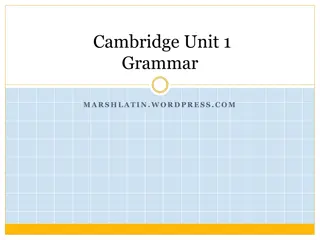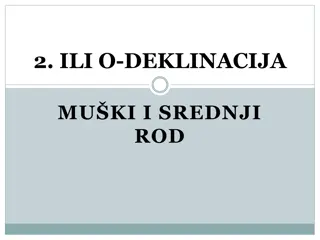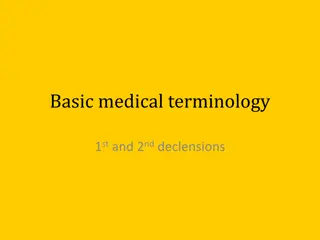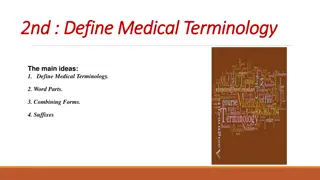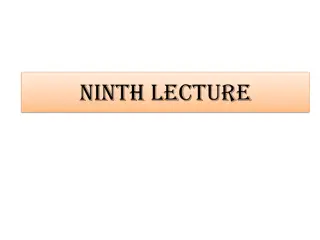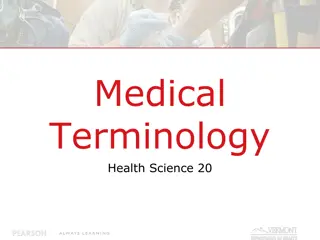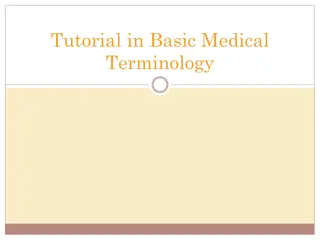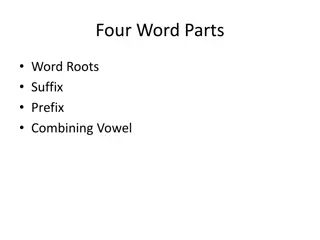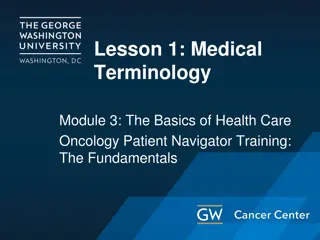Medical Terminology Seminar 2: Pronunciation Practice and Latin Declensions
Join our Medical Terminology Seminar 2 to practice pronouncing challenging medical terms like Infarctus myocardii recens and learn about Latin declensions to identify noun stems. Explore the genitive endings of Latin declensions and practice giving declensions of various body part nouns. Enhance your medical vocabulary and language skills in this interactive seminar.
Download Presentation

Please find below an Image/Link to download the presentation.
The content on the website is provided AS IS for your information and personal use only. It may not be sold, licensed, or shared on other websites without obtaining consent from the author. Download presentation by click this link. If you encounter any issues during the download, it is possible that the publisher has removed the file from their server.
E N D
Presentation Transcript
Basic Medical Terminology SEMINAR 2
Pronunciation practice Infarctus myocardii recens Fractura comminutiva colli femoris lateris dextri Commotio cerebri Vulnus punctum thoracis ad pulmonem lateris sinistri penetrans Aethylismus chronicus Appendicitis acuta Intoxicatio carboneo hydroxydato (CO) gradus maioris
Pronunciation practice Typhus recurrens Tonsillitis purulenta recidivans Diabetes mellitus stabilis Dermatitis allergica protrahens Vitium cordis acquisitum Infarctus haemispherii sinistri cerebri, Hemiparesis Nephrolithiasis, colica renalis subsequens Tumor ventriculi ad investigationem et observationem
Revision: Latin declensions How do I decide to what declension a Latin noun belongs? on the basis of the ending of genitive singular What are the genitive endings of Latin declensions?
Revision: Latin declensions What is the stem of a Latin word? a form to which individual case endings are attached a part of the word which remains after the removal of the ending of genitive singular How can we identify the stem of a Latin noun? we take the genitive form (sg.) and remove the genitive ending vena, ven-ae musculus, muscul-i; diameter, diametr-i auris, aur-is; corpus, corpor-is arcus, arc-us; genu, gen-us facies, faci-ei
Practice: give the declensions of the nouns (cf. Handout 2, task 2) 0. corpus, oris, n. cutis, is, f. 1. caput, itis, n. 2. capilli, orum, m. 3. facies, ei, f. 4. os, oris, n. lingua, ae, f. 3 3 3 2 5 3 1 13.,18. digitus, i, m. 2 27. hypogastrium, ii, n. 29. truncus, i, m. 30. manus, us, f. 31. crus, cruris, n. 32. tarsus, i, m. talus, i, m. 33. pes, pedis, m. 34. hallux, ucis, m. 2 2 4 3 2 2 3 3 14. sulcus, i, m. 15.,28. penis, is m. 16. femur, oris, n. 17. genu, us, n. 19. frons, frontis, f. 2 3 3 4 3 5. mentum, i, n. 6. axilla, ae, f. 7. brachium, ii, n. 8. cubitus, i, m. 9. antebrachium, ii, n. 2 1 2 2 2 20. oculus, i, m. 21. nasus, i, m. 22. auris, is, f. 23. bucca, ae, f. 24. collum, i, n. cervix, icis, f. 25. pectus, oris, n. 26. abdomen, inis, n. 2 2 3 1 2 3 3 3 10. carpus, i, m. 11. pollex, icis, m. 12. palma, ae, f. 2 3 1
Practice: find the stems of the nouns (cf. Handout 2, task 3) ex: caput, capit-is skeleton, skeleti os, ossis cranium, cranii orbita, orbitae collum, colli cervix, cervicis thorax, thoracis costa, costae discus, disci processus, processus vertebra, vertebrae pelvis, pelvis coxa, coxae ilia, ilium coccyx, coccygis ischium, ischii pubes, pubis symphysis, symphysis nasus, nasi dens, dentis mandibula, mandibulae clavicula, claviculae scapula, scapulae sternum, sterni humerus, humeri arcus, arcus radius, radii ulna, ulnae metacarpus, metacarpi carpus, carpi phalanx, phalangis femur, femoris patella, patellae tibia, tibiae fibula, fibulae metatarsus, metatarsi
Revision: Gender The grammatical gender of a noun affects the form of all other words related to it (i.e. adjectives, pronouns, verbs). >> Latin adjectives change their forms depending on the ii noun to which they refer. ENGLISH 3 genders: HE refers to male humans and animals SHE refers to female humans and animals IT inanimate objects or animals LATIN 3 genders: masculine -> discipulus (he-student), musculus (muscle) feminine -> discipula (she-student), vena (vein) neuter -> corpus (body)
Revision: number and case LATIN = INFLECTIONAL LANGUAGE In many languages, Latin and Greek among them, nouns decline = inflect (change their form) for number and case. Inflection for number involves singular (sg.) : plural (pl.) forms (eg. forearm : forearms = antebrachium : antebrachia) and is present in English as well. Inflection for case involves changing the form of the noun according to its syntactic function/meaning. Latin has an extensive case system in which a special form is used for every specific meaning. In medical terminology, 4 out of 6 Latin cases are used to express the following meanings:
Revision: cases and their functions LATIN system of specific case endings + prepositions ENGLISH word order + prepositions subject of a phrase 1. NOMINATIVE subject (ending) 2. GENITIVE dependency of two nouns, possession (ending) possessive case = of prepositional phrase 4. ACCUSATIVE object, movement = direction (preposition + ending) 6. ABLATIVE place, location, instrument, cause (preposition + ending) prepositional phrase Accusative+ ablative = prepositional cases (i.e. they are used only after prepositions).
Change the following words into plural (cf. Handout 2, task 4) coxae cox- cervicis cervic- coxa_ _ _ _ _ _ _ _ _ _ _ _ _ _ _ _ _ _ _ _ _ _ _ _ _ _ _ _ coxae cervix_ _ _ _ _ _ _ _ _ _ _ _ _ _ _ _ _ _ _ _ _ _ _ _ _ _ _ _ _ _ cervices I III menti ment- arcus arc- mentum_ _ _ _ _ _ _ _ _ _ _ _ _ _ _ _ _ _ _ _ _ _ _ _ _ _ menta arcus _ _ _ _ _ _ _ _ _ _ _ _ _ _ _ _ _ _ _ _ _ _ _ _ _ _ _ _ _ _ arcus II IV
Introduction to Latin syntax AGREED ATTRIBUTE = noun + adjective (agreement in gender, number and case) Example: musculus (m.) longus = long muscle fractura (f.) aperta = open fracture caput (n.) longum = long head NON-AGREED ATTRIBUTE = noun in nominative + noun in genitive Meaning: state of dependency, possession Translation: of Example: fractura costae //fracturae costarum fracture of a rib ! = rib fracture = rib fractures fractures of ribs
Form non-agreed attributes (cf. Handout 2, task 5) ex: caput + costa > caput costae head of a rib caput femoris caput + femur -> caput fibulae caput + fibula -> caput humeri caput + humerus -> caput phalangis caput + phalanx -> caput radii caput + radius -> caput tali caput + talus -> caput ulnae caput + ulna ->
Prepositions and prepositional phrases Denote: spatial relations temporal relations causal relations other sub, infra, post post, ante propter, e/ex cum, sine Can be connected with: Accusative case (majority of prepositions used in medical terminology) Ablative case (A/AB, CUM, DE, E/EX, PRO, SINE) both Accusative and Ablative case = IN, SUB
Camera bulbi posterior
Connect nouns with prepositions (cf. Handout 2, task 6) sub scapula sub cute sub lingua sub oculum sub costam sub patellam in osse in dente in ore in cranium in orbitam in hypogastrium
1st declension (a-stems): Latin nouns Latin nouns belonging to the 1stdeclension have: Nouns of the 1stdeclension of MASCULINE GENDER: Names of specialists e.g. dentista, ae, m. Names of muscles e.g. agonista, ae, m.
1st declension: Latin paradigm case singular plural nom. vena venae gen. venae venarum accus. venam venas abl. ven venis
1st declension: nouns of Greek origin Nouns of Greek origin belonging to the 1stdeclension have: Genitive sg. ending Nominative sg. ending Gender -ES -AE -E -ES F M
1st declension: Greek paradigms systole, es, f. systole systoles diabetes, ae, m. diabetes diabetae diabetam diabeta nom. sg. gen. sg. accus. sg. systolen abl. sg. systole o all nouns declined like systole, es, f.are of feminine gender o all nouns declined like diabetes, ae, m.are of masculine gender o paradigms vena, systole, and diabetes have identical plural endings !!!


